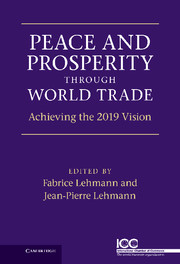Book contents
- Frontmatter
- Contents
- Notes on contributors
- Foreword
- Preface: the ICC vision
- Historical overview and dynamics
- Editorial note
- A Global systemic transformations
- B Governance of global trade
- C Poverty and global inequities
- D The long view on interlocking crises
- Editorial introduction
- D1 Trade and sustainable development: the ends must shape the means
- D2 Trade and climate change: the linkage
- D3 Destructive trade winds: trade, consumption and resource constraints
- D4 Trade and energy: a new clean energy deal
- D5 Agriculture and international trade
- D6 Water scarcity: how trade can make a difference
- D7 Water resources: a national security issue for the Middle East
- D8 Trade, technology transfer and institutional catch-up
- D9 A frail reed: the geopolitics of climate change
- E Global business responsibilities
- Conclusion: the imperative of inclusive global growth
- Index
D4 - Trade and energy: a new clean energy deal
Published online by Cambridge University Press: 05 July 2011
- Frontmatter
- Contents
- Notes on contributors
- Foreword
- Preface: the ICC vision
- Historical overview and dynamics
- Editorial note
- A Global systemic transformations
- B Governance of global trade
- C Poverty and global inequities
- D The long view on interlocking crises
- Editorial introduction
- D1 Trade and sustainable development: the ends must shape the means
- D2 Trade and climate change: the linkage
- D3 Destructive trade winds: trade, consumption and resource constraints
- D4 Trade and energy: a new clean energy deal
- D5 Agriculture and international trade
- D6 Water scarcity: how trade can make a difference
- D7 Water resources: a national security issue for the Middle East
- D8 Trade, technology transfer and institutional catch-up
- D9 A frail reed: the geopolitics of climate change
- E Global business responsibilities
- Conclusion: the imperative of inclusive global growth
- Index
Summary
Trade is as old as humanity. Initially based on barter, markets emerged to facilitate the exchange of goods and services. Trade became international, then global, and the globalization process continues today.
Sometimes, however, markets don't work effectively, or they just fail – the 2008–2009 financial crisis being a perfect example of the interaction of market and policy failures – and a regulator needs to step in to provide a solution. Ideally, this enables the market to rebound, without distorting it in the process, and provides the framework to address problems. Failing to do so could lead to fundamental discontinuities or tipping points. Markets also don't deal well with ‘externalities’ such as climate change and sustainability, issues increasingly driven by trade globalization and the rise of the BRICs (Brazil, Russia, India and China) and other high-growth emerging markets.
Trade and energy: an enduring dilemma
Globalization proponents argue that trade has created wealth and enabled millions of people to escape poverty. From 1990 to 2005 alone, the number of people living on less than US$1.25/day fell from 1.8 billion to 1.4 billion, an unparalleled achievement – although the World Bank expects the 2008–2009 crisis to trap tens of millions more in poverty. Overall, human development improved as economies grew and living standards rose.
Opponents argue that world trade and the endless corporate search for natural resources, markets and profits, has impaired the Earth's ability to support its inhabitants (current and future).
- Type
- Chapter
- Information
- Peace and Prosperity through World TradeAchieving the 2019 Vision, pp. 201 - 206Publisher: Cambridge University PressPrint publication year: 2010
- 1
- Cited by

